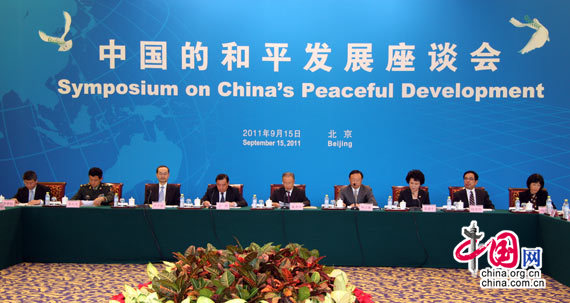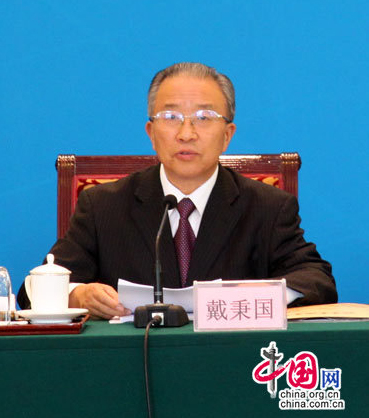China's peaceful rise benefits all
- By Guo Xiaohong
 0 Comment(s)
0 Comment(s) Print
Print E-mail
China.org.cn, September 16, 2011
E-mail
China.org.cn, September 16, 2011
China's peaceful rise is beneficial to both China and the rest of the world as countries today are more interdependent and the fates of people across the world are more closely connected, said State Councilor Dai Bingguo at a symposium on China's peaceful development in Beijing yesterday. More than 200 people from ministries and top research organizations attended the symposium.
|
|
|
A symposium on China's peaceful development was held in Beijing on Sept. 15, 2011. More than 200 people from ministries and top research organizations attended the symposium. [By Luo Qi/ China.org.cn] |
According to Dai, China's peaceful rise strategy echoes the trend of international relationships, which aim to establish peace, seek cooperation and promote development. Dai further stated that the white paper on China's peaceful development, released on Sept. 6, reiterated China commitment to the path of peaceful development. The paper states that the strategy is China's long-standing choice, and that it has both a historical basis and policy support.
|
|
|
State Councilor Dai Bingguo delivers a speech at the symposium. [By Luo Qi / China.org.cn] |
However, Dai cautioned that China still faces great challenges, both from inside and outside in its aim of peaceful development. China has a huge population, a development imbalance and an underdeveloped economy. The country will, in the long run, continue with its major task of improving the welfare of its people. By doing so, China will also greatly contribute to world peace and stability. Yet China needs global understanding and support in its pursuit of peaceful development.
Wang Jisi, a veteran expert in Sino-US relations and dean of the School of International Studies at Peking University was also at the symposium. He said that China's reaffirmation of its peaceful rise also aims to dispel doubts and criticism from outside.
According to Wang, China has witnessed a drastic change in its relations with the world. China’s fast-growing economy has led to misunderstanding, suspicion and fear from outside, including the US. China should deal with all of this in an open-minded manner.
Wang said: "Like State Councilor Dai said months ago: The notion that China wants to replace the United States and dominate the world is a myth." China is decades, if not a century, behind in terms of economic development. The country does not seek hegemony. It won't vie for position in the world order. China will fulfill its due responsibility, as before, in safeguarding world peace and common prosperity.
China's white paper helps answer the doubts from outside while also addressing its own internal problems, such as energy consumption, according to Wang. The country is now transforming its economic structure to boost its domestic market, instead of exporting these problems. The world has benefited, and will continue to benefit, from China's rise as its emerging economy brings greater opportunities.
Both the world and China should accept China's rise. China needs respect and understanding from outside. China will keep improving its peaceful development strategy, drawing from current and future experiences.







